Government reassures auto sector of support to help revive demand
It is challenging times for the automobile sector but various representatives of the government reassure at the SIAM convention that they have got the automobile industry’s back, in terms of sops, policy push and measures to revive demand.
The automobile industry in India contributes nearly 49 percent to the manufacturing GDP and more than 7 percent to the overall GDP and has grown at a CAGR of 16 percent over twenty-five years barring the last two years. The going over the last six quarters has been rather tough and the lockdown to contain the Covid-19 spread further compounded troubles for the already struggling auto industry. Therefore, the theme of the 60th Annual Convention of the Society of Indian Automobile Manufacturers (SIAM) organised today titled “Re-Building the Nation, Responsibly”, was particularly striking.
Spanning over three primary sessions, the Convention touched upon the current challenges for the industry and strived to look at charting out a roadmap for future growth.
Looking for more government support
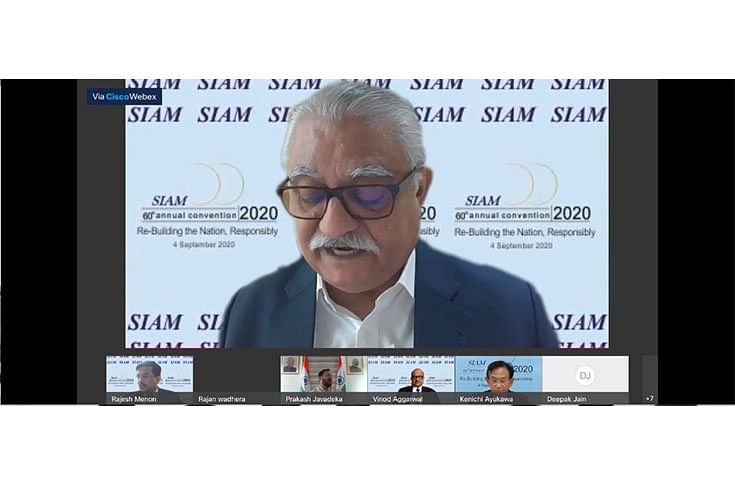
Rajan Wadhera, president, SIAM and senior advisor, Mahindra & Mahindra kickstarted the virtual convention with his opening remarks. Wadhera stated that 2020 was a tough year for the automotive industry due to the impact of Covid-19, supply disruption for critical components and related concerns. Though, “longway still to achieve FY2019 sales levels for the automotive sector”, Wadhera pointed out that the GST reduction on two-wheelers was a welcome measure in terms of reviving demand. He suggested GST cut on automotive sales and component introduce incentive-based scrappage policy and also fund allocation for STUs for procuring buses. However, the SIAM President made an important point when he stressed that, “Commensurate revenue not realised on the volume of investment done for BS VI due to lack of consumer demand. Auto industry is not in a state to make additional investment for CAFÉ and RDE norms likely over next two years.”
In terms of impact the PV segment saw the highest slowdown in over two decade, the downturn in CVs is the biggest in last 15 years while the two-wheeler slowdown has now continued for over six quarters. In Q1 FY2021 the industry sold around 1 million vehicles, a sharp drop of 71 percent.
While there has been some respite in last two months in terms of retails on the back of pent up demand, growth in rural economy, the challenges of uncertainty of jobs and growth continues to worry. He was optimistic that the government will come up with more steps, to support and revive the demand. This is because Wadhera said, “The ownership cost has gone up in past two-three years. Industry volumes almost at levels we were 10 years ago. We need to grow at a rapid pace if we want to stick to Automotive Mission plan by 2026, need some real hard steps in terms of demand boosters. GST a crucial aspect in that context. An overdose of regulation at the current stage not welcome in the step towards reviving demand.”
Partnership between government and industry crucial
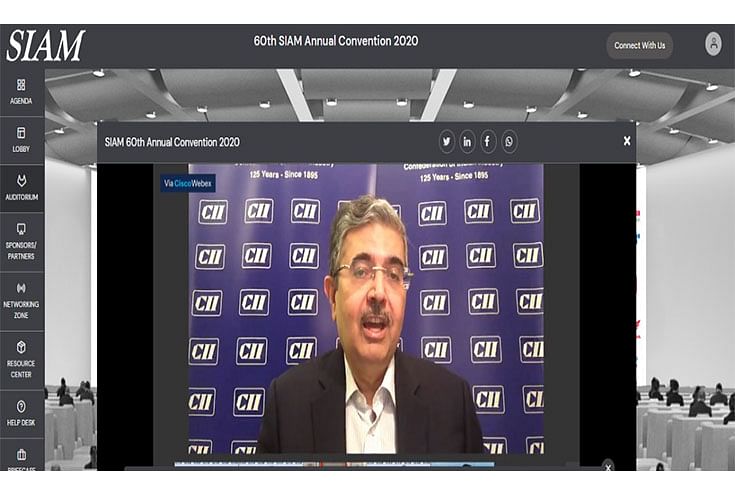
Reviving demand is the key concern and Uday Kotak, president, CII and MD and CEO, Kotak Mahindra Bank stated that, “Over the past few months, the government of India has shown sensitivity towards lives and livelihood. Partnership between the government and Industry key to coming out of current uncharted times."
Kotak said SIAM and auto manufacturing is a large part of India’s manufacturing segment. Highlighting three major factors to watch for the automotive industry, Kotak said that with the festival season coming up the government could look at providing some push to revive demand, “The key for auto sector it is important for them to be able to support demand with supply. Finally, the government needs to invest in infrastructure, which will build the long-term foundation for auto sector. That would also help in the medium term for the economy and job creation. The auto industry is facing supply side bottlenecks and there are disruptions to supply chain due to lockdown. Need a seamless cooperation between states and Centre to tide over these times. Otherwise we may see a supply shock despite festival-led demand."
The government perspective
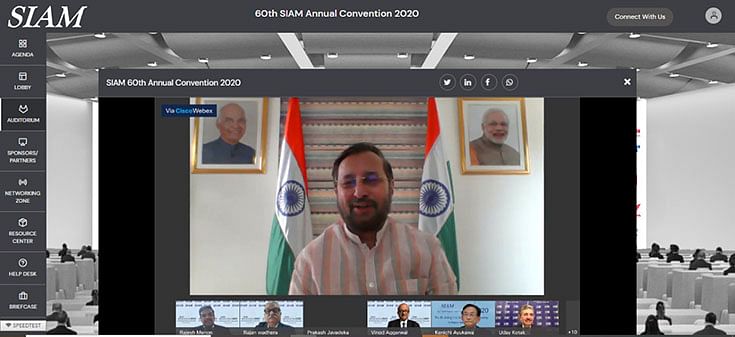
The Guest of Honour, Prakash Javadekar, Union Minister of Environment, Forest & Climate Change, Information & Broadcasting and Heavy Industries & Public Enterprises reassured the Industry about he government’s constant endeavour to revive demand. Javadekar assured that the government is ready to discuss and work with the industry to find a way forward. India is now a country known for less taxation, and more of ease of doing business, and even in innovation index from 80th position to 41.
He stated that , “Of the 5,000 electric buses to be procured by the government nearly 1,000 have come and another 1,500 were in pipeline. The government will also be issuing tenders for 2,500 e-buses that will focus on Indian companies.” The minister said that the government has already introduced a number of reforms such as GST, Insolvency and Bankruptcy Code, given subsidies to EVs.
According to Javdekar, “allowing battery swapping will help in bringing down the cost of electric vehicles, taking note of the demands of the auto industry. Will discuss your demand for GST with concerned ministry, Automotive mission is under revival. There may be some delay, but confident on the industry. Will invite suggestions for what government can do to help for festival season. We are also ready with scrappage policy in all aspects, likely to be announced as soon as possible.”
On the context of a greater EV adoption in the country, Javdekar felt, “lack of adequate infrastructure for EVs also a concern. Now we have started, several private players have joined in. Battery swapping will also help rationalise cost. Electric two-wheelers and three-wheelers have started picking up. Lower usage cost is a major plus for EV users.”
Need for a long-term roadmap
In a special message to the minister, Dr Pawan Goenka, MD, Mahindra & Mahindra said that, “we need to move away from the problem that we are facing today. The AMP plan was created five years ago, we need a new long-term plan for auto industry given the current situation and challenges.
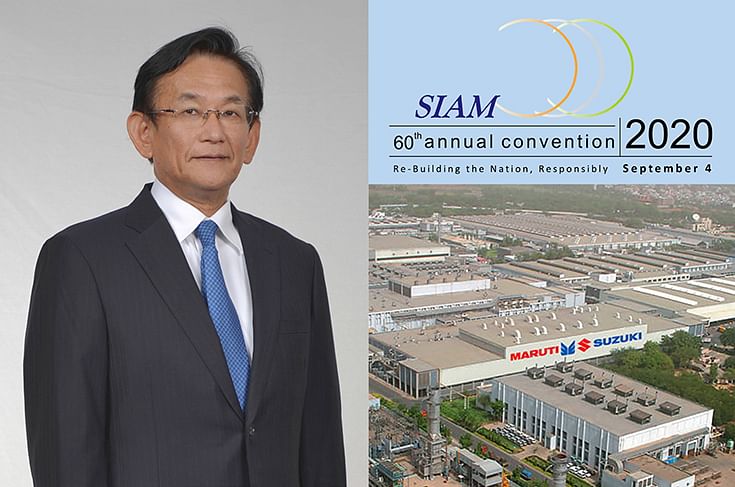
Kenichi Ayukawa, MD and CEO, Maruti Suzuki India, who was elected SIAM president today delivered the vote of thanks for the first session. He thanked the minister and said the industry was happy to hear that the government is listening and assuring that its concern on GST reductions will be taken up, “it is important for OEMs to maximise production and increase volumes, this will also keep government revenues healthy. Sound development of the industry over next two years is crucial. We are facing one of the toughest time in the history, the industry needs the support, we eagerly await reduction in GST, and Scrappage policy. The revenue from taxes will be more than what the government will bear.”
Infrastructure development to revive demand
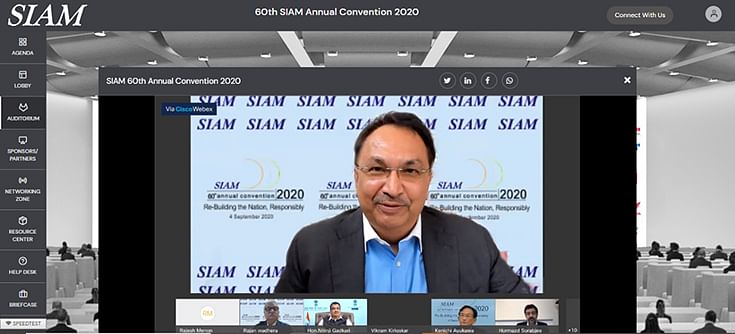
Vikram Kirloskar, Past President, SIAM & Vice Chairman, Toyota Kirloskar Motor delivered the opening remarks for the next plenary session on “A Long Term Regulatory Roadmap and Infrastructure Development”. He outlined that the, “Auto sector will play a pivotal role in India’s march towards self reliance. Policy intervention and regulations should look at the larger national good. A comprehensive policy will help industry make informed implementation. Last one year has been challenging for auto industry. Future long-term automotive needs to help industry help industry recoup lost ground.”
Charting out a future roadmap for the industry, Kirloskar highlighted, “We have a serious problem of air and water pollution and need to reduce the carbon footprint in the long-run. Need a long-term vision and plan for automotive industry. Industry needs a fixed timeline but it cannot change mid-way. But we cannot afford a change in between. A longer timeline with clear targets will help.”
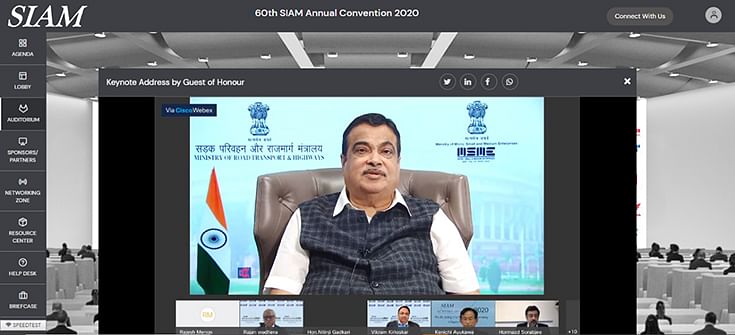
Nitin Jairam Gadkari, Union Minister of Road Transport & Highways and Micro, Small and Medium Enterprises, Government of India was the guest of honour in this session. Starting off his presentation on an optimistic note, “Expect India to overcome the Covid-19 challenge. Marching ahead to make India top manufacturing hub. Reducing logistic cost, infra cost is crucial to become competitive globally.”
Roads are important not just in terms of revving up automobile demand but also generating income and the Transport Minister detailed out his Ministry’s progress in this context, “has invested heavily in road infrastructure including 22 new green express highway, this will offer impetus to auto Industry. Within two years will be in position to launch Mumbai- Delhi express highway. Will be making seven express highway including this.”
Gadkari reiterated that the government’s highest priority is towards smart mobility, “Current rate of road building improved to 3 km/day. India today has one of the highest road network.”
Congratulating the auto industry on the speedy transition to BS VI, the Minister was hopeful that “Latest emission norms will help address consistent pollution concerns across the country. Need to take into account the practical problems of the auto industry stakeholders in implementation of regulation.
In this context, Gadkari also mentioned that “His mInistry has plans to make ethanol economy of 1 lakh crore. We are allowing making ethanol from rice. It is time now to convert rice and surplus food grain to bio-ethanol.”
He pointed out that road safety rules and regulations being implemented now and, “will help bring down the rate of road accidents. ABS, seatbelt, reverse park assist are some the features that have allowed Indian auto industry to be at par with global safety standards.”
Looking at constructive roadmap for sustainable development of auto industry, Gadkari stressed on, “localisation and requirement of cost competitiveness will help industry. Call upon constructive suggestion from SIAM. Need cooperation, communication and coordination of all auto industry stakeholders for smooth functioning and we can also seek expert views. A platform/think tank like that will take into account all these factors will help us resolve many issues.”
Touching on the EV issue and recent government nod for battery swapping, he explained that this move is primarily, “to address standardisation and fixing quality norms for EV batteries. Won’t compromise on the quality. Battery tech is very dynamic, we will go with what the market forces decide.”
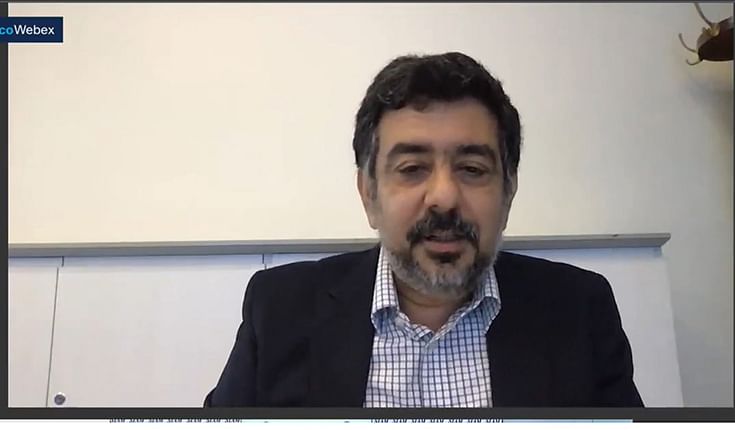
The Q&A session was moderated by Hormazd Sorabjee, Editor, Autocar India. Encapsulating the current state of affairs across the auto industry, he pointed out that, “The BS VI implementation has come at a record time but it has come with a cost. Going forward need a roadmap with a realistic timeline taking into account the interest of all stakeholders including customers. Globally capital is very scarce across automobile industry. A national fuel road map and a staggard approach may help.”
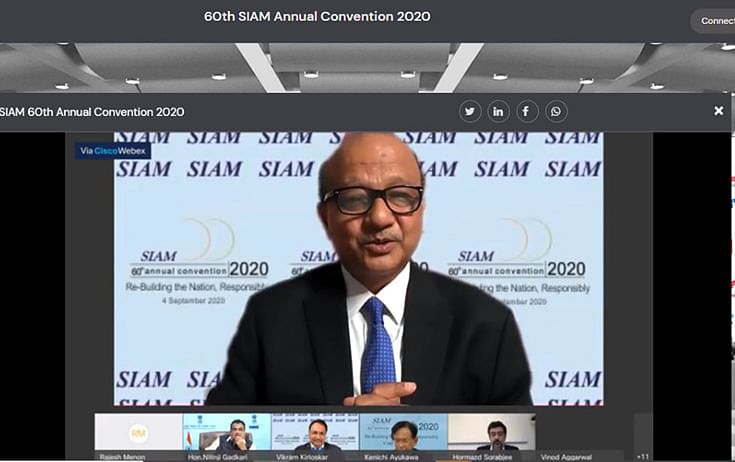
The concluding remarks for the session was delivered by Vinod Aggarwal, Treasurer, SIAM & managing director and CEO, VE Commercial Vehicles. He pointed out that, “Infra investment is extremely important for economy and the growth of CV industry is directly linked to economic improvement. This helps the consumption levels. Heavy duty truck sales down nearly 90 percent from previous levels. For us to reach 2018-1019 levels, it will take 2-3 years and this infra investment will help the CV segment.”
Increased localisation
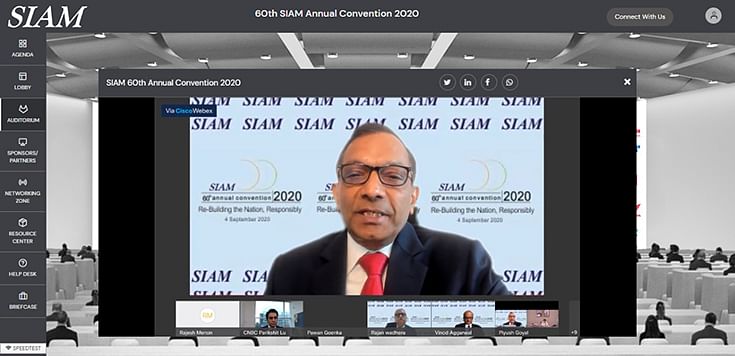
The theme for the third and the final session was ‘AtmaNirbhar–The Roadmap to Increased Localisation and Harnessing Export Potential of the Indian Auto Industry’. Dr Pawan Goenka, past President, SIAM and managing director, Mahindra & Mahindra opened the session. He highlighted that, “the entire auto industry resonated the concept of make in India, shining example of Atmanirbhar Bharat. Commit ourselves to increase exports, reduce imports, invest in R&D. Challenges are nothing new for auto industry and confident of overcoming it.”
According to him, “ACMA and SIAM members are committing reducing imports by half in next 4-5 years. Electronic components a key area to focus on in this context. For increasing exports, we need to be cost competitive. Unfavourable FTA playing havoc on competitiveness of auto industry. Power tariff and logistic costs also add to the industry’s burden. Independent of Covid-19, the auto industry has been going through a challenging 2-3 years. Wil use this Covid-19 crisis to rethink and strategise.”
Detailing the key export destinations for India, Goenka said “South and central America are the largest export destination for India. South Africa is another major auto export destination and east Africa too a potentially large market.”
However, “Logistic cost and the FTA major disabler for India, especially in case of exports, Korea and Japan exporting almost 50% of what they manufacture. India needs a roadmap of how to increase exports from current 16% to about 35%,” Goenka said.
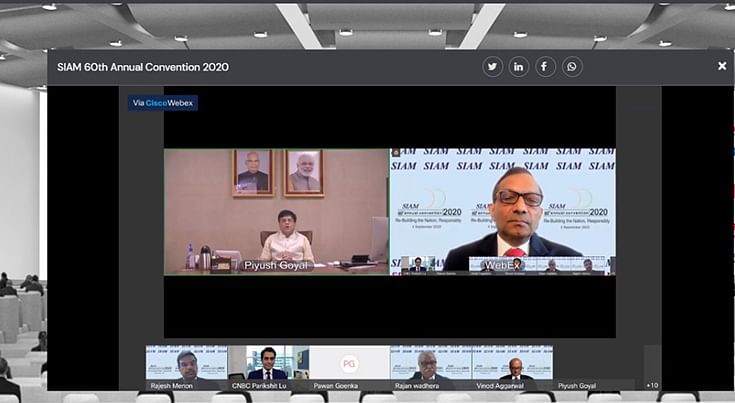
Piyush Goyal, Minister of Commerce & Industry and Railways was the guest of honour for the session. Praising the automobile industry’s resilience, adaptability and innovation potential, he said, “the auto industry will emerge stronger on the other side of the crisis. No doubt in my mind that the sector, even the CV segment will come up with innovative measure to overcome the current challenge.”
“Strengthening supply chains globally and creating sustainable value chains is a huge opportunity for India, especially for sectors like the automotive industry” said Goyal and added that the need for social distancing will act as an impetus for the auto industry as the number of people choosing to travel in personal vehicles is likely to increase.
In a bid to support the auto Industry the Railways introducing attractive freight rates and lucrative terms to attract more freight transport from auto industry. He felt, “This will also save diesel and trucking cost for the industry. We are open to more suggestions from auto industry and work together for better partnership on also increasing localisation and seek to enhance India’s equal engagement globally.”
According to Goyal, the exports have to go up from the existing levels if Indian automotive industry intends to dominate globally. However, there are several tariff and non-tariff barriers with various countries which hamper the smooth operations of exports and his government has taken up the issues with the concerned countries. “It has to be based on reciprocity. We are reviewing FTAs and looking at factors that can help exports, need to look at innovation, EVs and autonomous vehicles to drive exports from India and open new markets for India”, Goyal added.
When asked to comment on what the government is doing to attract foreign companies from investing in India, Goyal pointed out that, “Engaging with global companies looking for sustainable value chain, trusted manufacturing base, reviewing on case by case basis. No case of one size fits all. Need to identify sectors where we have the competitive edge, automobile industry is one such industry. It has the ability to create scale, a crucial factor to enhance competitiveness.”
On the growth opportunities in the EV segment he noted that India needs to, “look at the entire EV ecosystem in totality and not become dependent on other countries. Domestic availability of raw materialisation may be a problem but focus needs to be on higher localisation of the overall ecosystem.”
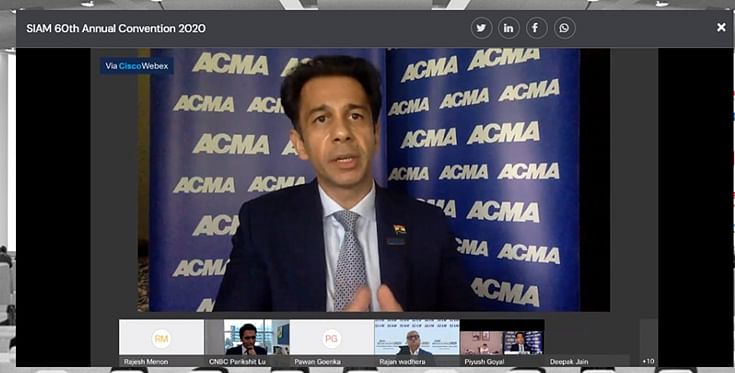
Deepak Jain, President, ACMA and chairman and managing director, Lumax Industries delivered the closing note for the session and the convention. He highlighted the primary agenda for the industry as whole, “It is time to enhance existing skills for the auto industry to be globally competitive- manufacturing excellence and quality key factors. ACMA, SIAM and FADA together with ASDC preparing curriculum for next generation requirements.”
ACMA and SIAM working closely to enhance global exports from the auto industry in India. “Need investment in creating new technology and product development. Indian auto industry has to gear up to tackle the challenges of downturn but also adapt to be globally competitive,” Jain signed off.
RELATED ARTICLES
Cosmo First diversifies into paint protection film and ceramic coatings
The Aurangabad, Maharashtra-based packaging materials supplier is leveraging its competencies in plastic films and speci...
JSW MG Motor India confident of selling 1,000 M9 electric MPVs in first year
The 5.2-metre-long, seven-seater luxury electric MPV, which will be locally assembled at the Halol plant in Gujarat, wil...
Modern Automotives targets 25% CAGR in forged components by FY2031, diversifies into e-3Ws
The Tier-1 component supplier of forged components such as connecting rods, crankshafts, tie-rods, and fork bridges to l...






 By Autocar Professional Bureau
By Autocar Professional Bureau
 04 Sep 2020
04 Sep 2020
 12690 Views
12690 Views














